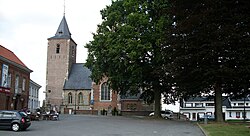Hemelveerdegem
Hemelveerdegem | |
|---|---|
Village | |
 Saint John the Baptist Church of Hemelveerdegem (2009) | |
| Coordinates: 50°48′N 3°51′E / 50.800°N 3.850°E | |
| Country | |
| Region | Flemish Region |
| Province | East Flanders |
| Municipality | Lierde |
| Area | |
| • Total | 2.80 km2 (1.08 sq mi) |
| Population (2021)[1] | |
| • Total | 383 |
| • Density | 140/km2 (350/sq mi) |
| Time zone | CET |
Hemelveerdegem is a village and borough which makes up part of the municipality of Lierde in the Denderstreek in the Belgian province of East Flanders. The village and estate were ruled from 1752 by the armigerous Boelare family.
Overview
[edit]The village was first mentioned around 963 as Ermfredeghe.[2] In 1752, the village became part of the barony of Boelare.[3] In 1977, the municipality was merged into Lierde.[4]
The Saint John the Baptist Church mainly dates from the 18th century, however some parts have been estimated to originate from the 14th to 16th century.[3] The reredos (altar piece) dates from the early 16th century, and is considered a masterpiece of wood work.[5] The church has been designated a protected monument in 1969.[6]
The village's coat of arms shows a beehive with a lion behind it. The arms were granted on 4 August 1818 and were confirmed on 7 September 1928.[2]
References
[edit]- ^ a b "Bevolking per statistische sector - Sector 45063B". Statistics Belgium. Retrieved 6 May 2022.
- ^ a b "Hemelveerdegem". Lierde (in Dutch). Retrieved 24 October 2020.
- ^ a b "Hemelveerdegem". Agentschap Onroerend Erfgoed (in Dutch). Retrieved 24 October 2020.
- ^ "Lierde". Agentschap Onroerend Erfgoed (in Dutch). Retrieved 24 October 2020.
- ^ "Sint-Jan de Doperkerk". Vlaamse meesters in situ (in Dutch). Retrieved 24 October 2020.
- ^ "Parochiekerk Sint-Jan de Doper". Agentschap Onroerend Erfgoed (in Dutch). Retrieved 24 October 2020.
External links
[edit] Media related to Hemelveerdegem at Wikimedia Commons
Media related to Hemelveerdegem at Wikimedia Commons


